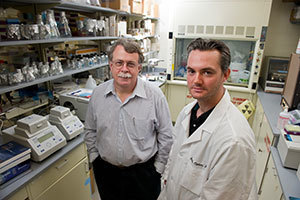
University of Notre Dame biologists are reporting the development of an easy-to-use, low-cost method of detecting dengue virus in mosquitoes based on gold nanoparticles. Their research is published in the Virology Journal this week.
The assay they have developed is able to detect lower levels of the virus than current tests, and is easy to transport and use in remote regions.
Half of the world’s population is at risk of dengue virus infection. The disease infects 50 million to 100 million people per year. Approximately one half-million of those affected require hospitalization, and many of the infected children will die. The dengue virus is one of the most dangerous viruses in the world with no available vaccine, and it does not respond to antiviral therapy. The main method of controlling infection remains the destruction of the standing water where the mosquitoes breed.
It is consequently vitally important to have a test that can be used on-site and that does not require specialized equipment in order to determine if mosquitoes are carrying dengue virus.
Researchers from Notre Dame used a DNAzyme linked to gold nanoparticles that recognized a short sequence of the viral RNA genome common to all four types of dengue. Once bound, adding magnesium and heating to 37 degrees Celsius (98.6 F) causes the DNAZyme to cut the RNA, leaving the gold nanoparticles free to clump together. This aggregation can easily be seen as a red to clear change.
The components of this test are stable at temperatures above 30 degrees Celsius (86 F), which means that they are easy to store and transport, and the assay is able to detect as few as 10 viruses in each sample containing 10-20 mosquitoes.
The ultimate goal is to detect virus infection in just a single infected mosquito or cell. James Carter, the lead author of this study, explained, “Full development of our novel DDZ-AuNP detection method will provide a practical, rapid and low-cost alternative for the detection of DENV in mosquito cells and tissues, and possibly infected patient serum, in a matter of minutes with little to no specialized training required.”
Notre Dame researchers James Carter, Velmurugan Balaraman, Cheryl A. Kucharski, Tresa Fraser and Malcolm Fraser Jr., the Rev. Julius A. Nieuwland, C.S.C., Professor of Biological Sciences, were co-authors on the paper.
Contact: Malcolm Fraser, 574-631-6209, mfraser@nd.edu